You can Download KSEEB Solutions for Class 8 Maths Chapter 11 Mensuration Ex 11.2 Questions and Answers to help you to revise the complete syllabus.
KSEEB Solutions for Class 8 Maths Chapter 11 Mensuration Ex 11.2
Question 1.
The shape of the top surface of a table is a trapezium. Find its area if its parallel sides are 1 m and 1.2 m and the perpendicular distance between them is 0.8 m.
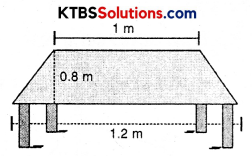
Solution:
Length of parallel sides are = 1.2 m and 1 m
Height = 0.8 m
Area of trapezium = \(\frac{1}{2}\) (Sum of y sides) × h
= \(\frac{1}{2}\) (1.2 + 1) × 0.8
= \(\frac{1}{2}\) × 2.2 × 0.8
= 2.2 × 0.4
= 0.88 cm2
![]()
Question 2.
The area of a trapezium is 34 cm2 and the length of one of the parallel sides is 10 cm and its height is 4 cm. Find the length of the other parallel side.
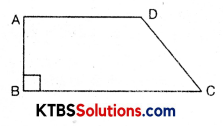
Solution:
Area of trapezium = 34 cm2
Length of one parallel side = 10 cm
Height = 4 cm
Let length of other parallel side = x
∴ Area of trapezium = \(\frac{1}{2}\) (Sum of y sides) × h
⇒ 34 = \(\frac{1}{2}\) × (10 + x) × 4 = (10 + x) × 2
⇒ \(\frac{34}{2}\) = 10 + x
⇒ 17 = 10 + x
⇒ 17 – 10 = x
⇒ x = 7
∴ other parallel side = 7 cm
Question 3.
Length of the fence of a trapezium shaped field ABCD is 120 m. If BC = 48 m, CD = 17 m and AD = 40 m, find the area of this field. Side AB is perpendicular to the parallel sides AD and BC.
Solution:
Perimeter of trapezium = 120 m
AB + BC + CD + AD = 120
AB + 48 + 17 + 40 = 120
AB + 105 = 120
AB = 120 – 105 = 15 m
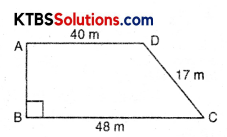
Area of trapezium ABCD = \(\frac{1}{2}\) (Sum of y sides) × h
= \(\frac{1}{2}\) (48 + 40) × 15
= \(\frac{1}{2}\) × 88 × 15
= 44 × 15
= 660 m2
![]()
Question 4.
The diagonal of a quadrilateral shaped field is 24 m and the perpendiculars dropped on it from the remaining opposite vertices are 8 m and 13 m. Find the area of the field.
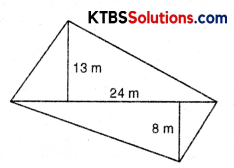
Solution:
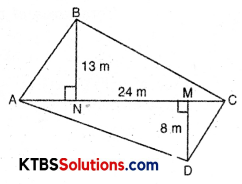
Area of quadrilateral ABCD = ar. ∆ABC + ar. ∆ACD
= \(\frac{1}{2}\) × AC × BN + \(\frac{1}{2}\) × AC × DM
= \(\frac{1}{2}\) × AC (BN + DM)
= \(\frac{1}{2}\) × 24 (13 + 8)
= 12 × 21
= 252 cm2
Question 5.
The diagonals of a rhombus are 7.5 cm and 12 cm. Find its area.
Solution:
Diagonals of rhombus are = 7.5 cm and 12 cm.
Area of rhombus = \(\frac{1}{2}\) × d1 × d2
= \(\frac{1}{2}\) × 7.5 × 12
= 7.5 × 6
= 45.0 cm2
![]()
Question 6.
Find the area of a rhombus whose side is 6 cm and whose altitude is 4 cm. If one of its diagonals is 8 cm long, find the length of the other diagonal.
Solution:
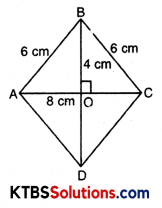
Diagonals of a rhombus bisects perpendicularly.
Since, BD and AC are diagonals.
∴ OB ⊥ AC and OD ⊥ AC
ar. ∆ABC = \(\frac{1}{2}\) × Base × Height
= \(\frac{1}{2}\) × 8 × 4
= 16 cm2
ar. ∆ABC = ar. ∆ADC [∵ Diagonal divides the rhombus in two triangles of equal area]
∴ ar. ∆ADC = 16 cm
\(\frac{1}{2}\) × AC × OD = 16
\(\frac{1}{2}\) × 8 × OD = 16
OD = \(\frac{16 \times 2}{8}\) = 4 cm
∴ Other diagonal BD = OB + OD
= 4 + 4
= 8 cm.
Question 7.
The floor of a building consists of 3000 tiles that are rhombus-shaped and each of its diagonals is 45 cm and 30 cm in length. Find the total cost of polishing the floor, if the cost per m2 is Rs. 4.
Solution:
Diagonals of rhombus shaped tile = 45 cm and 30 cm
Area of tile = \(\frac{1}{2}\) × d1 × d2 [Area of rhombus]
= \(\frac{1}{2}\) × 45 × 30
= 45 × 15
= 675 cm2
Number of tiles = 3000
Total area of tiles = 3000 × 675
= 2025000 cm2
= \(\frac{2025000}{100 \times 100}\) m2
= 202.5 m2
Cost of polishing 1 m2 floor = Rs. 4
Cost of polishing 202.5 m2 = 202.5 × 4 = Rs. 810.0
![]()
Question 8.
Mohan wants to buy a trapezium-shaped field. Its side along the river is parallel to and twice the side along the road. If the area of this field is 10500 m2 and the perpendicular distance between the two parallel sides is 100 m, find the length of the side along the river.
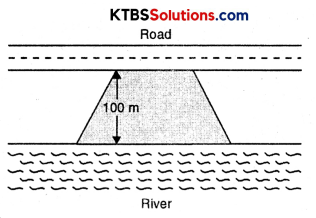
Solution:
Let the length of trapezium shaped field along road = x m
∴ Length along river = 2x m
Distance between parallel sides = 100 m
Area of field = 10,500 m2
⇒ \(\frac{1}{2}\) (Sum of y sides) × h = 10,500
⇒ \(\frac{1}{2}\) (x + 2x) × 100 = 10500
⇒ \(\frac{1}{2}\) (3x) × 100 = 10500
⇒ x = \(\frac{10,500 \times 2}{100 \times 3}\)
⇒ x = 35 × 2
⇒ x = 70 m
∴ Length along road = 70 m
Length along river = 2 × 70 = 140 m
Question 9.
The top surface of a raised platform is in the shape of a regular octagon as shown in the figure. Find the area of the octagonal surface.
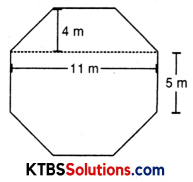
Solution:
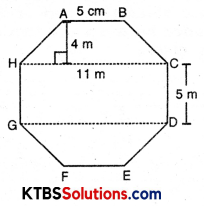
Area of octagonal surface = 2 ar. of trapezium + ar. of rectangle
= 2[\(\frac{1}{2}\)(Sum of || sides) × h] + l × b
= 2 × \(\frac{1}{2}\) [(11 + 5) × 4] + 11 × 5
= 16 × 4 + 11 × 5
= 64 + 55
= 119 m2
![]()
Question 10.
There is a pentagonal-shaped park as shown in the figure. For finding its area Jyoti and Kavita divided it into two different ways.
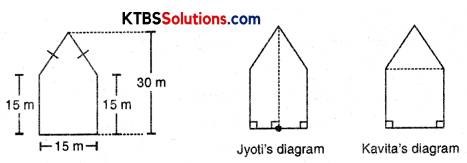
Find the area of this park using both ways. Can you suggest some other way of finding its area?
Solution:
Jyoti divided pentagon ABCDE by drawing DM ⊥ AB
Hence, AM = \(\frac{1}{2}\) AB
= \(\frac{1}{2}\) × 15
= 7.5 m
ar. of trapezium AMDE = \(\frac{1}{2}\) (Sum of y sides) × h
= \(\frac{1}{2}\) × (15 + 30) × 7.5
= \(\frac{1}{2}\) × 45 × 7.5
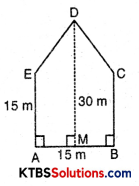
Since, area of trapezium AMDE = ar. trapezium BCDM
∴ ar. of pentagon ABCDE = 2 ar. of trapezium AMDE
= 2 × \(\frac{1}{2}\) × 45 × 7.5
= 45 × 7.5
= 337.5 cm2
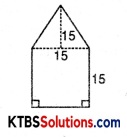
Kavita’s area = Area of square + Area of triangle
= 15 × 15 + \(\frac{1}{2}\) × 15 × 15
= 225 + \(\frac{225}{2}\)
= 225 + 112.5
= 337.5 cm2
![]()
Question 11.
The Diagram of the adjacent picture frame has outer dimensions 24 cm × 28 cm and inner dimensions 16 cm × 20 cm. Find the area of each section of the frame, if the width of each section is the same.
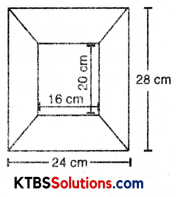
Solution:
Area of outer frame = 24 × 28 = 672 cm2
Produce PQ both side intersecting AD at M and BC at N.
MP = QN = x (say)
x + 16 + x = 24
⇒ 2x + 16 = 24
⇒ 2x = 24 – 16
⇒ 2x = 8
⇒ x = 4 cm
∴ Area of APSD = \(\frac{1}{2}\) (28 + 20) × 4
= \(\frac{1}{2}\) × 48 × 4
= 96 cm2
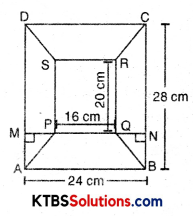
Since, area of APSD = ar. of BCRQ
∴ area of BCRQ = 96 cm2
area of ABQP = \(\frac{1}{2}\) (24 + 16) × 4
= 40 × 2
= 80 cm2
ar. of RCDS = 80 cm2